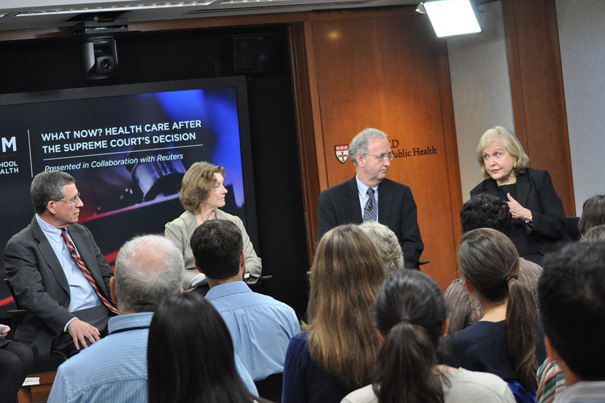
The panel “What Now? Health Care After the Supreme Court’s Decision” focused in part on the changes in the law’s Medicaid provisions. Experts Robert Blendon (from left), Wendy Mariner, John McDonough, and Regina Herzlinger weighed in on the topic.
Aubrey R. La Medica/HSPH
Balky states likely to join Medicaid expansion
Panel on health care reform suggests U.S. funds will create tempting carrot
If you pay for it, they will come.
That was the opinion of experts gathered at the Harvard School of Public Health Friday, as they discussed the national health care reform law’s dramatic expansion of Medicaid, a key provision of which the Supreme Court struck down in its landmark decision approving most of the program Thursday.
While much initial attention focused on the justices’ 5-4 decision supporting the constitutionality of the “individual mandate,” which requires the uncovered to purchase health insurance or pay a penalty, the major change forced by the court is in the law’s Medicaid provisions.
The original legislation, officially called the Patient Protection and Affordable Care Act, required states to expand Medicaid to cover people whose incomes are at up to 133 percent of the federal poverty level. States that refused would not only have forgone additional federal funds, they would have lost all of their other Medicaid dollars as well. It is that steep financial penalty for not participating that the court struck down, making the Medicaid expansion essentially voluntary for states.
John McDonough, professor of the practice of public health and director of the Harvard School of Public Health’s (HSPH) Center for Public Health Leadership, said that some states took more than a decade to participate in the original 1965 Medicaid program. Similarly, it may take several years for all of the states to join this expansion, but he said they eventually will. That’s because the health care law requires the federal government to pay the entire cost of the expansion for the first three years and 90 percent of it thereafter.
“This is a strikingly good deal for the states,” McDonough said, adding later about Medicaid’s original adoption: “After a while, people watched New York get all the money and finally said, ‘Maybe we’ll get some for Arizona.’ ”
McDonough was among four experts who participated in a session of The Forum at Harvard School of Public Health. The program, “What Now? Health Care After The Supreme Court’s Decision,” also featured Robert Blendon, HSPH professor of health policy and political analysis, Wendy Mariner, the Utley Professor of Health Law, Bioethics, and Human Rights at Boston University School of Public Health, and Regina Herzlinger, the McPherson Professor of Business Administration at Harvard Business School. The event, webcast live, was presented in collaboration with Reuters and was moderated by Reuters health care reporter Toni Clarke.
The Medicaid expansion, of course, is contingent on the law surviving any winds of change in the November election. Blendon said the issue is extremely polarizing politically, with 75 percent of Republicans wanting it repealed and 70 percent of Democrats feeling it is a historic achievement.
Blendon predicted that the law’s repeal will form a central tenet of the Republican platform for the upcoming election, from the presidency on down. He predicted that voters will hear a lot from Obama about the law’s provisions and benefits, while Romney and other Republicans will seize on the court’s determination that the individual mandate is essentially a tax, and pound away at voters with an anti-tax message.
Herzlinger and McDonough said that the Republican position has become more anti-reform over time. At one time, Herzlinger said, both parties agreed that everyone needed health care coverage, though they disagreed over how to accomplish that. Republicans then favored tax credits and other incentives to prompt the private sector to expand coverage to uninsured populations, a position that seems to have been replaced by a “no reform” stance.
McDonough predicted that the states will wait to see what happens in November before deciding whether to begin embracing the Medicaid expansion. Until then, the states have plenty to do in setting up the insurance exchanges, which are intended to offer a variety of options for the uninsured who are affected by the individual mandate.
The idea of an individual mandate is not unique to the United States, Herzlinger said. Several European countries, including Germany, Switzerland, and the Netherlands, provide universal health care to their residents through similar mechanisms. And the U.S. penalty — 2.5 percent of income — is peanuts compared with the inducements in, say, Switzerland, where if you don’t prove to the government that you’ve purchased health insurance, the government buys it for you, bills you, and, if you don’t pay, takes your house. Switzerland has 99 percent health insurance coverage.
“The Swiss, they’re not that nice, but they’re very efficient,” concluded Herzlinger.
Though critics have said the reform won’t bring down health care costs, panelists said cost savings will be hard to achieve as long as the debate is focused on whether or not everyone is entitled to coverage. Once people stop fighting over that, they said, attention can turn to devising ways to wring excessive costs out of the system.
In Massachusetts, whose own health reform plan has achieved near-universal coverage, at 98 percent, there are signs that the rising cost spiral may be slowing, McDonough said. While the state in 2009 was ranked tops in the nation for health care costs, over the past couple of years it has fallen to ninth, he said.
“When you get coverage out of the way, you can focus on costs,” McDonough said.
But Herzlinger questioned how transferrable the Massachusetts example may be to other states, mainly because the state is one of the nation’s wealthiest. The national health care reform law will increase costs by $1 trillion nationally, an amount she termed “worrisome,” so cost-cutting will have to be a big part of the program.




